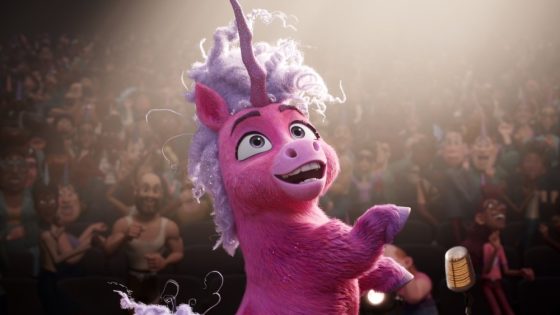Closer in tone to the sharp adult series “BoJack Horseman” than to Illumination’s bland “Sing” franchise, Netflix’s “Thelma the Unicorn” avoids being rendered completely unoriginal by its overly familiar premise thanks to consistent splashes of acid humor and a plethora of wacky supporting characters. Reimagined from the popular 2015 children’s book by Aaron Blabey, this bright-colored fable concerns a female pony chasing musical stardom disguised as a horned magical creature. But by changing her identity to chase those ambitions, Thelma betrays herself and those who truly know her.
The adaptation marks the animated feature debut for co-directors Jared Hess and Lynn Wang. Hess, still best known for co-writing and directing the 2004 indie hit “Napoleon Dynamite,” received an Oscar nomination earlier this year for the handcrafted animated short “Ninety-Five Senses” about a Death Row inmate. He shared the accolade with his wife and careerlong collaborator Jerusha Hess (also his co-writer on “Thelma”). That honored work is a far cry from this universe where humans coexist with talking animals.
Former Alabama Shakes frontwoman Brittany Howard voices the conflicted singing heroine. There’s an appealing dissonance between the look of the stubby pony and the performer’s potent pipes, which seem better suited for soulful rock tunes than vapid pop. Howard’s privileged voice gets the point across that regardless of Thelma’s physical appearance, it’s her talent that should earn her the audience’s attention.
Interestingly, one key departure from the source material is Thelma’s design, which likely took its cues from Howard’s hair and personality. Though it appears animals in this world are not subservient to humans, Thelma still labors at a farm alongside her loyal donkey friends and bandmates Otis (Will Forte) and Reggie (“Napoleon Dynamite” star Jon Heder).
The trio have a band, the Rusty Buckets, that has failed to qualify for a major music festival. Their luck might change, however, when Thelma becomes a sensation overnight. As soon as she serendipitously transforms into a glittery pink fake unicorn with a carrot for a horn, one can immediately infer that the climax will revolve around her secret being disclosed. A viral video (animals have cell phones here, even though they walk on all fours and have no way to store them) convinces Vic Diamond (Jemaine Clement), an unscrupulous manager who resembles a character straight from the 1970s — think Swan in “Phantom of the Paradise” — to pursue Thelma and transform her into his next profitable success.
When in leans into its desire to be a cynical parody of the music industry, à la “Popstar: Never Stop Never Stopping,” that’s when “Thelma the Unicorn” briefly feels biting in a comical manner. Scenes involving Nikki Narwhal (Ally Dixon), an aquatic pop diva jealous of Thelma’s impending breakout, and Vic comment on the perils of the business: At one point, Vic reads Nikki a vicious review of her Las Vegas show, and later he absurdly pilots a boat on the Los Angeles River. Once Thelma signs with Vic, she gets the old Hollywood treatment by entering into a fabricated romance with a famous horse, and there’s even a jab at artificial intelligence when a computer instantly writes an idiotic hit single about cud.
From a visual standpoint, “Thelma the Unicorn” looks nearly indistinguishable from other nondescript computer-animated projects. Most of the human characters read as if they could be plucked from or plugged into a “Despicable Me” movie without anyone noticing. Likewise, the animals could walk on stage in “Sing” as if they’d always belonged there. On a granular level, differences may exist between these, but to the naked eye, what’s noticeable is the uninspired homogeneity in design, texture and lighting.
Still, the Hess duo interject bizarre humor into their screenplay via background characters by giving us a glimpse into their inner lives. Watch out for a short, middle-aged man obsessed with Thelma to the point he wants to be her son, probably a dig at the Bronie subculture of adult men who adore “My Little Pony.” Or perhaps chuckle at the gallows humor of a girl asking Thelma’s “boyfriend” to sign the urn containing her grandmother’s ashes. The collection of these tangential moments (of which there are plenty) ring more memorable than the core narrative and its obvious message. Although not as offbeat as last year’s “Leo,” Hess and Wang’s effort has enough gutsy flourishes to redeem it.
Source Agencies




